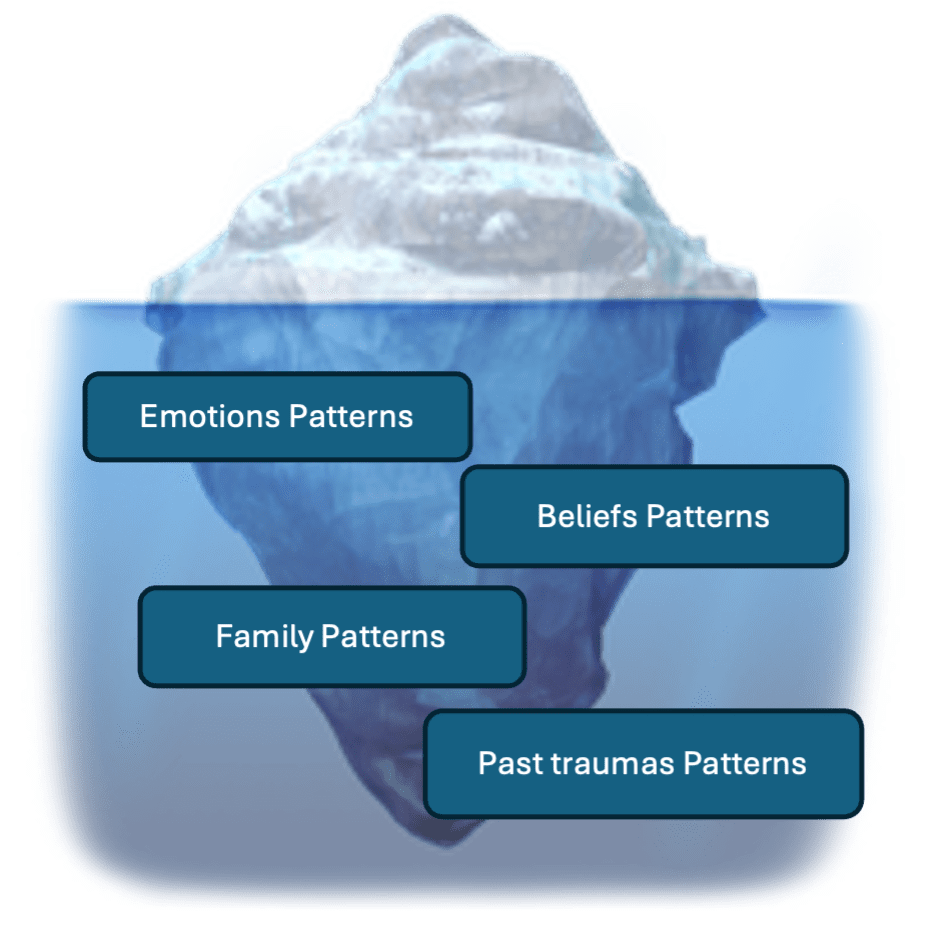
Have you ever wondered why it’s so difficult to resist certain foods or why your food choices aren’t always the healthiest? Well, you’re not alone. Our eating habits are influenced by a variety of factors, from our emotions and past experiences to our culture and social environment.

Imagine an iceberg floating in the ocean. The visible part above the surface represents our eating behaviours, such as what we eat and when we eat. However, the majority of the iceberg is submerged, representing the hidden factors that drive our eating habits – our emotions, beliefs, family patterns, past traumas, and cultural influences.
To truly understand our eating habits, we need to explore the underlying roots. This is where the iceberg metaphor becomes a valuable tool. By examining the hidden layers of the iceberg, we can uncover the emotional, psychological, and social factors that shape our food choices. This gives us a deeper insight into why we eat what we eat and empowers us to make positive changes to our diet.
So, how can we begin to explore the roots of our eating habits? Here are some simple steps:
For this activity, you’ll create an iceberg diagram similar to the one shown in the image. At the bottom, list all the eating patterns you may have, which could include emotions, beliefs, family patterns, or past traumas. Utilize your self-awareness by taking the time to reflect on your eating habits and recognize any recurring patterns.

The 3 STEPS
After analysing the roots of your eating habits using the iceberg metaphor, you’ll be ready to start planning positive changes to your diet. Here are some tips to help you do that:
i.Set Realistic Goals: Set specific and achievable goals to improve your eating. Focus on making gradual and sustainable changes over time.
ii. Develop an Action Plan: Create a plan for healthy and balanced meals that includes a variety of nutritious foods. Make a shopping list and prepare your meals in advance to avoid impulsive food decisions.
iii. Stay Mindful: Practice mindful eating by paying attention to your body’s hunger and fullness cues. Eat slowly and savour each bite, avoiding distractions like television or cell phones during meals.
iv. Seek Support: Engage friends, family, or a healthcare professional in your change process. Having a support system can keep you motivated and accountable for your eating choices.
v. Be Kind to Yourself: Remember that changing eating habits takes time and effort. If you have an occasional slip-up, don’t beat yourself up. Instead, get back on track and keep progressing towards healthier eating.
As we conclude our exploration of the roots of our eating habits, let’s appreciate the power of self-awareness and deliberate change. By delving into the layers of emotions, beliefs, and experiences that influence our relationship with food, we’ve taken a significant step towards a healthier life.
Change isn’t always easy, but it’s achievable. Each insight gained and every small step towards healthier eating is a victory. Let’s embrace this journey with compassion and resilience, knowing that our efforts contribute to our well-being.
As you continue towards healthy eating, stay curious, committed, and connected. Seek support, celebrate successes, and learn from challenges. Remember to be kind to yourself.
Thank you for joining me on this journey. May your newfound understanding lead you to a life of nourishment, vitality, and joy. Here’s to a healthier, happier you!
Explore our website for more valuable insights, practical tips, and delicious recipes to support your journey toward a healthier and happier you!

Join Weight Goals with Aba’s WhatsApp community and gain exclusive access to our hub of articles and recipes. Be part of a supportive community, receive valuable insights, and stay up-to-date with the latest in nutrition, fitness, lifestyle, and medicine. Elevate your weight goals journey by joining us today.

Talk to Aba